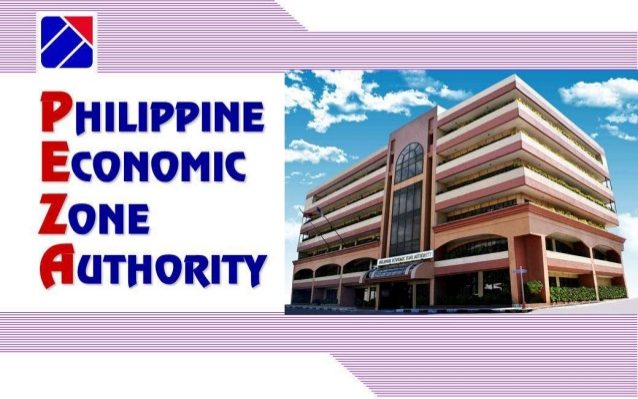PEZA
Philippine Economic Zone Authority (PEZA) – attached to the Department of Trade and Industry (DTI) – is the Philippine government agency in charge of promoting investments, extend assistance, register, grant incentives to and help the business operations of investors in export-oriented manufacturing and service facilities inside selected areas throughout the country known as PEZA Special Economic Zones.
It oversees and administers incentives to developers/operators of and locators in world-class, ready-to-occupy, environment-friendly, secured and competitively priced Special Economic Zones.
PEZA’s dynamic, responsive and client-oriented ethics have earned the trust and confidence of investors in its Special Economic Zones, the local business sector, and the foreign chambers of commerce in the Philippines. All Industrial Economic Zones are manned by a PEZA officer and staff to immediately attend to stakeholders’ needs and concerns. Information Technology companies are attended to by Head Office.
Many foreign companies setting up export enterprises in the Philippines such as outsourcing and offshoring operations may opt to register with PEZA for tax incentives. Xternal Co will support our clients in determining eligibility for PEZA registration and organize all financial documents to be processed.
Companies registered with the Philippine Economic Zone Authority (PEZA) may be entitled to income tax holidays of four, six, or eight years. After that, they are subject to 5% tax on gross income (sales less direct costs) in lieu of all local and national taxes. Enterprises that are registered with the Subic Bay Metropolitan Authority (SBMA) or Subic Bay Freeport Zone, are also subject to the special 5% tax and cannot avail of tax holidays. Qualified entities registered with the Clark Development Corporation and located in the Clark Freeport Zone are entitled to similar incentives.
An enterprise must register with PEZA and locate their operation in one of the PEZA zones, buildings, IT Parks, or Technology Parks to obtain tax breaks and incentives offered by PEZA. PEZA registrants must generally be export-oriented. Enterprises located inside the zones are required to export 100% of their production. In some cases, PEZA may approve the sale of up to 30% of production in the domestic market.
Full foreign ownership of a PEZA enterprise is allowed, provided they are not engaged in activities that appear on the Foreign Investment Negative List. PEZA approval and specific incentives granted are on a case to case basis.
Our team will assist on the following:
- Determine eligibility for PEZA
- Process all required documents for PEZA
- Identify a PEZA building for you
- Register your new company with PEZA
PEZA Documentary Requirements
- Project brief – the completion of the project brief entails the submission of additional documents relating to the statements made therein
- Anti-graft certificate
- Board Resolution authorizing the filing and designation of a representative
- SEC Certificate of Registration, Articles of Incorporation and By-Laws
- Project Feasibility Study – information and documents necessary in the preparation of the project feasibility study
General and Technical Data and Document Requirements:
- Parent company and product brochures
- Description of the new project (include description and uses of the service)
- Detailed organizational chart
- Project timetable
- Potential market, marketing costs, marketing program
- Service process and flowchart
- List of equipment, country of equipment origin, rated capacity, and corresponding costs
- Materials, their sources and prices; supply contracts, if any; ratio of imported to local materials, if applicable
- Area requirement, office lay-out
- Equipment lay-out
- Electricity and water requirements
- Types and volume of wastes and waste disposal system
- Bio-data of principal officers
- Certificate of registration with the Securities and Exchange Commission; and
- Articles of incorporation
Financial Data and Document Requirements:
- Number of employees, position and salary rates, training to be provided and length of training, classification of employees as to a) skilled, semi-skilled, and unskilled, b) direct, indirect, and administrative
- Number of foreign experts to be hired, positions, salary rates, length of stay
- Projected volume of sales, selling price, and unit of measure
- Breakdown of other dollar costs (interest on loans, salaries of foreign personnel)
- Number of workdays per year, number of shifts per day
- Sources of financing (please indicate whether loans to be obtained are foreign-currency-denominated or not)
- Latest audited financial statements, if any; and
- Parent company’s latest volume and value of sales, net income, total assets, and number of total employees, if applicable
The Philippine Board of Investments (BOI)
Is an attached agency of Department of Trade and Industry (DTI). It is tasked to spearhead projects aimed at increasing foreign investments into the country.
Annually the BOI, along with other government agencies, comes up with an Investment Priorities Plan (IPP). The IPP is an approved list of priority activities for investments. The IPP is significant since all industries whose business activity falls under the list can be registered as such and shall enjoy fiscal and non-fiscal benefits.
The following are the Fiscal Incentives:
- Income Tax Holiday
- Exemption from taxes and duties on imported spare parts
- Exemption from wharf age dues and export tax, duty, impost and fees
- Reduction of the Rates of Duty on Capital Equipment, Spare parts and Accessories by virtue by Virtue of EO 528
- Tax exemption on breeding stocks and genetic materials
- Tax Credits
- Additional Deductions from Taxable Income.
The following are the Non-Fiscal Incentives:
- Employment of Foreign Nationals
- Simplification of customs procedures
- Importation of consigned equipment
- The privilege to operate a bonded manufacturing/trading warehouse subject to custom rules and regulations
A Filipino enterprise can register their activity with the BOI if their project is listed as a preferred project in the current IPP. Said enterprise may engage in domestic –oriented activities listed in the IPP whether classified as pioneer or non-pioneer. However, an activity which is not listed, may also be entitled to incentives if the following conditions are met:
- At least 50% of the production is for export (for 60% Filipino-40% Foreign-owned enterprises); or
- At least 70% of production is for export (for more than 40% foreign–owned enterprises)
For foreign-owned firms or those whose foreign participation exceeds 40% of the outstanding capital stock who intend to engage in domestic-oriented activities, they can only be registered with BOI if they propose to engage in an activity listed or classified in the IPP as pioneer. However, if it fails to meet the pioneer classification, it can likewise opt to be an export-oriented firm to qualify for BOI registration. However, this time, the export requirement is at least 70% of actual production.
Our firm is ready to render services for
BOI – Board of Investments registration
CEZA – Cagayan Economic Zone Authority
TIEZA – Tourism Infrastructure and Enterprise Zone Authority
We will begin the service by determining your eligibility for registration and we will take you through all the other steps for your company to be registered.

